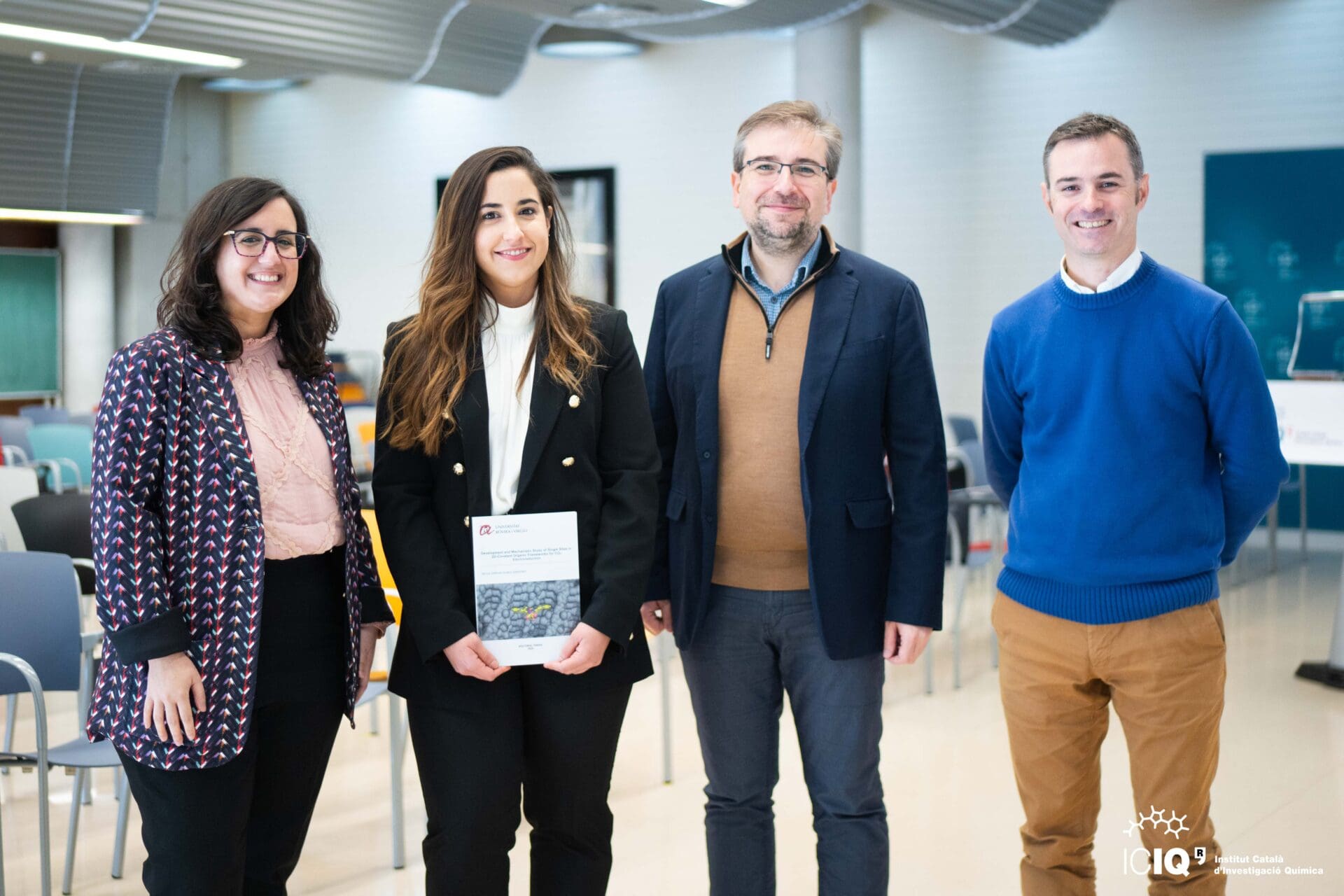Bravo, Dr. Dubed!
Geyla Dubed Bandomo, PhD student under the supervision of Prof. Julio Lloret-Fillol (ICIQ), has defended her PhD thesis entitled “Development and Mechanistic Study of Single Sites in 2D-Covalent Organic Frameworks for CO2 Electroreduction” (assigned to the Inorganic and Physical Chemistry Department of the Universitat Rovira i Virgili) publicly on November 22nd.
The members of the evaluation committee were Dr. Agustí Lledó Ponsatí (from Universitat de Girona), Dr. Sascha Ott (Uppsala University) and Dr. María Escudero Escribano (from ICN2, the Catalan Institute of Nanoscience and Nanotechnology)

Dr. Dubed with her thesis supervisor and the members of the evaluation committee, Dr. Lledó and Dr. Escudero.
Dr. Geyla Dubed is from Cuban and studied Radiochemistry at the Higher Institute of Advanced Technologies and Sciences (Instec) in La Havana. Then, she did a Master’s in Electrochemistry at the Center for Research and Technological Development in Electrochemistry (CIDETEQ) in Queretaro, Mexico. The master’s work was related to the characterization of new materials and their evaluation in photoelectrochemical applications. Later, she began her doctoral studies at ICIQ under the direction of Prof. Julio Lloret.
She is a person who enjoys watching movies and series and loves chocolate.
Dr. Dubed received special funding from La Canonja Green Educational and Scientific Project and a URV International Mobility Grant.
Why did you become a scientist?
I have always been curious about the origin of everything that surrounds us. We cannot think about our current society without starting to question the origin of everything. Science is everywhere.
During my undergraduate degree, I began to study organic molecules that could make it possible to detect Alzheimer’s in its early stages, and I became fascinated with the different areas of work that are ultimately connected with chemistry. So, after finishing my degree, it was clear to me that I wanted to become a scientist. With a career in science, you can explore the world, make fascinating discoveries, and help improve the lives of others.
What do you want to achieve as a scientist?
I want to understand different processes that today are very complex and that in the future we can all apply this information in real applications.
What is your thesis about?
My research is based on the development and mechanistic study of new catalysts for the conversion of the CO2 waste into new renewable fuels and chemical products.
What triggered your interest for the subject of your thesis?
A global awareness has been reached with efforts to limit the global temperature rise to 2C. In this sense, we need a greener and more sustainable production of fuels and chemicals, due to the large anthropogenic CO2 emissions from the burning of fossil fuels.
Now, the great challenge to face is to reverse this situation through an economically feasible technology to capture and transform CO2 into valuable chemical compounds. Cheap access to renewable electricity unlocks a potential solution through electrocatalytic CO2 reduction for fuels and chemicals.
What applications can your thesis have in the future?
The development of a technology that can capture and transform CO2 into valuable chemical compounds and can also solve our dependence on fossil fuels and leverage the existing infrastructure.
The thing that I like most about my thesis is….
What I like most about my thesis is that our study shows the richness and complexity of lattice materials and the possibility to consider their application in many different fields, not only in energy, but also with sensors, molecular machines
From the lessons learnt (or skills developed) at ICIQ, which one do you value the most?
Independent work and be resolute in the face of problems
What ICIQ moment you´ll never forget?
When my first paper was accepted
What will you miss the most from ICIQ?
All my friends who have accompanied me throughout this time
What do you wish you had known at the beginning of your PhD?
It is a hard and sacrificed process, but at the same time exciting and definitely worth it.
What advice do you have for someone who’s starting their PhD now?
Open your mind, with chemistry everything is possible!!!!
Who/What has been your biggest influence/motivation?
Marie Curie was undoubtedly one of the most important characters in contemporary history, and one of the most influential women. Besides being the first woman to win a Nobel Prize, she is the only woman to win the prize in two different fields.
Where are you going next?
I will start a postdoc with my supervisor Julio Lloret to continuous the CO2 reduction research line
Chemistry/Science is fun because…
You can understand from simpler to more complex systems
What is your favourite molecule?
CO2 is currently a problem due to environmental pollution but it may be the solution towards a society that can use CO2 as a raw material to produce fuels and chemical products. To big troubles, big solutions
If you were a piece of lab equipment, what would you be?
It would be a spectroelectrochemical cell, with it we can access not only information on the main characteristics of our materials but also their active centers and their dynamic responses to different stimuli, which makes it possible for us to understand these systems and implement all this information in the optimization of them for future applications
Tell us something about you that people might not know…
I like to crochet, it’s a relatively new hobby for me, but I absolutely love it!!!!!
Related news

Let's create a brighter future
Join our team to work with renowned researchers, tackle groundbreaking
projects and contribute to meaningful scientific advancements







 20-12-2024
20-12-2024 


















